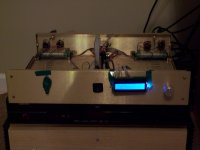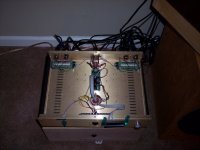Dang! shipping for 4 units ?
And are those for the Joshua tree...? in which case I definatley want them so long.
And are those for the Joshua tree...? in which case I definatley want them so long.
Mute outputs on the Darwin Boards
Guys,
I'm going to be ordering a two Darwins and two Joshua Trees soon. I have a question though:
I'm currently finalising the Amp building for my two sets of speakers. They are remote from the preamps ( for which I'm going to be using your boards ). I have some of Rod Elliott's ESP boards controlling "Soft start" for the mains and detecting DC on the speaker outputs and providing a muting function at the power amp outputs.
I want to provide a means of remotely muting and unmuting the Power Amps ( and preamps ) with a 12V signal line from the preamp.
In order to avoid having the Power Amp relays potentially arc, I want the power amp relays to mute last ( after the Preamp mutes ) and unmute first ( before the preamp unmutes ), so the power amp outputs are always sitting at 0v when the relays change state ( apart from when they fire in a fault condition - nothing I can do about that! ).
Are there a couple of outputs on the controller that can be used for this, and if so, do you provide this functionality ( or could you? ). I'm assuming you aren't providing the source code for the PIC - if you do, I could reprogram it quite easily.
Alternatively, I can design a circuit to do it, but it seems a wasted opportunity if I've already got a controller in the preamp box.
Regards
Alister
Guys,
I'm going to be ordering a two Darwins and two Joshua Trees soon. I have a question though:
I'm currently finalising the Amp building for my two sets of speakers. They are remote from the preamps ( for which I'm going to be using your boards ). I have some of Rod Elliott's ESP boards controlling "Soft start" for the mains and detecting DC on the speaker outputs and providing a muting function at the power amp outputs.
I want to provide a means of remotely muting and unmuting the Power Amps ( and preamps ) with a 12V signal line from the preamp.
In order to avoid having the Power Amp relays potentially arc, I want the power amp relays to mute last ( after the Preamp mutes ) and unmute first ( before the preamp unmutes ), so the power amp outputs are always sitting at 0v when the relays change state ( apart from when they fire in a fault condition - nothing I can do about that! ).
Are there a couple of outputs on the controller that can be used for this, and if so, do you provide this functionality ( or could you? ). I'm assuming you aren't providing the source code for the PIC - if you do, I could reprogram it quite easily.
Alternatively, I can design a circuit to do it, but it seems a wasted opportunity if I've already got a controller in the preamp box.
Regards
Alister
This is a great use for the output relays on the Darwin. In fact, in my setup, the Darwin and JT are the first things to shut down at power down, purely by virtue of the size of the power supplies involved, so signal is cut to the amps almost instantly.
We don't currently provide the functionality you want, but it should be easy to code into the JT pic. I believe we have published the source earlier in the thread somewhere (I'd would have to look).
We added pads for all the unused pins so such additions could be made easily. The JT code is tiny, so there should be no memory space limitations. The source code is in PICC-Lite.
We have talked about doing a power sequencing circuit with soft start, but there is only so much time in the day 😉.
We don't currently provide the functionality you want, but it should be easy to code into the JT pic. I believe we have published the source earlier in the thread somewhere (I'd would have to look).
We added pads for all the unused pins so such additions could be made easily. The JT code is tiny, so there should be no memory space limitations. The source code is in PICC-Lite.
We have talked about doing a power sequencing circuit with soft start, but there is only so much time in the day 😉.
Brian,
Thanks for the swift reply. I'd be happy to do the recoding to supply this functionality if the SC is available and you don't want to do it - just let me know.
I had looked for the SC, but couldn't find it. I'll have another check.
Regards
Alister
Thanks for the swift reply. I'd be happy to do the recoding to supply this functionality if the SC is available and you don't want to do it - just let me know.
I had looked for the SC, but couldn't find it. I'll have another check.
Regards
Alister
alister said:Brian,
Thanks for the swift reply. I'd be happy to do the recoding to supply this functionality if the SC is available and you don't want to do it - just let me know.
I had looked for the SC, but couldn't find it. I'll have another check.
Regards
Alister
Hi Alister,
I have posted the source here:
http://www.twistedpearaudio.com/forum/default.aspx?g=posts&t=28
Cheers!
Russ
Brian,
Thanks - got the SC, and have downloaded the PICCLite. I'll post the modified source back here asap.
Thanks - got the SC, and have downloaded the PICCLite. I'll post the modified source back here asap.
IR controller tested 🙂
Hey folks, grabbed a few hours this weekend to mod a stock JT controller PCB to make this monstrosity.
🙂
It can decode RC5 or Sony remotes(selectable) and works perfectly right now. I only have very basic firmware working right now, but it is interrupt driven(the PIC is sleeping when there is no IR command).
Anyway I will post how do it later. 🙂
Cheers!
Russ
Hey folks, grabbed a few hours this weekend to mod a stock JT controller PCB to make this monstrosity.
🙂
It can decode RC5 or Sony remotes(selectable) and works perfectly right now. I only have very basic firmware working right now, but it is interrupt driven(the PIC is sleeping when there is no IR command).
Anyway I will post how do it later. 🙂
Cheers!
Russ
Attachments
Member
Joined 2002
Re: guts...
VERY Nice! Looks good, i love the champaign case 🙂
J'
Russ White said:here are the inards....
VERY Nice! Looks good, i love the champaign case 🙂
J'
stepped attenuator
i was just looking at your attenuator project as a add on for my txo. what is the maximum cycle design for the relays. do you expect to encounter relay contact fatique or surface breakdown a few years down the line. have you thought of possibly making a chip resistor version about one third the size which would fit on the back of the face plate in the preamp. real nice i think i need one of these. all you and brian need now is a cnc to make some billet cases like jrdg.
i was just looking at your attenuator project as a add on for my txo. what is the maximum cycle design for the relays. do you expect to encounter relay contact fatique or surface breakdown a few years down the line. have you thought of possibly making a chip resistor version about one third the size which would fit on the back of the face plate in the preamp. real nice i think i need one of these. all you and brian need now is a cnc to make some billet cases like jrdg.
Re: stepped attenuator
The G6K relays we use are rated for millions of cycles. If you sat there and did nothing but change volume all day it would probably take a few decades to wear one out. 🙂
They have a mechanical reliability rating of 50 Million cycles. They have a electrical reliability of 100K cycles, but thats at full rated current (where you will get some arcing). At the tiny current we are using this number approaches the mechanical rating.
Yes we could make the board s a bit smaller,but at the cost of builder flexibility, but its already pretty small at 1.5" x 4". I have mounted them to the backs of chassis.
Cheers!
Russ
tryonziess said:i was just looking at your attenuator project as a add on for my txo. what is the maximum cycle design for the relays. do you expect to encounter relay contact fatique or surface breakdown a few years down the line. have you thought of possibly making a chip resistor version about one third the size which would fit on the back of the face plate in the preamp. real nice i think i need one of these. all you and brian need now is a cnc to make some billet cases like jrdg.
The G6K relays we use are rated for millions of cycles. If you sat there and did nothing but change volume all day it would probably take a few decades to wear one out. 🙂
They have a mechanical reliability rating of 50 Million cycles. They have a electrical reliability of 100K cycles, but thats at full rated current (where you will get some arcing). At the tiny current we are using this number approaches the mechanical rating.
Yes we could make the board s a bit smaller,but at the cost of builder flexibility, but its already pretty small at 1.5" x 4". I have mounted them to the backs of chassis.
Cheers!
Russ
Yes we could make the board s a bit smaller,but at the cost of builder flexibility, but its already pretty small at 1.5" x 4". I have mounted them to the backs of chassis.
...and you can currently use SMT resistors if you'd like.
attenuator
i had not realized it was as small as you described. plenty good like it is. you have a relay selector switch also????
i had not realized it was as small as you described. plenty good like it is. you have a relay selector switch also????
Member
Joined 2002
Jason,
Soon we will have a "master" controller with IR,RE,Display, etc and a module that will allow for control of the JT via I2C. It will likely be in the next couple months as there is a lot of design work yet to do, and other projects to wrap up. 🙂
Cheers!
Russ
Soon we will have a "master" controller with IR,RE,Display, etc and a module that will allow for control of the JT via I2C. It will likely be in the next couple months as there is a lot of design work yet to do, and other projects to wrap up. 🙂
Cheers!
Russ
Member
Joined 2002
Russ White said:Jason,
Soon we will have a "master" controller with IR,RE,Display, etc and a module that will allow for control of the JT via I2C. It will likely be in the next couple months as there is a lot of design work yet to do, and other projects to wrap up. 🙂
Cheers!
Russ
Perfect, May i ask what type of display ?
- Status
- Not open for further replies.
- Home
- Design & Build
- Parts
- A twisted tale about a logarithmic relay attenuator

